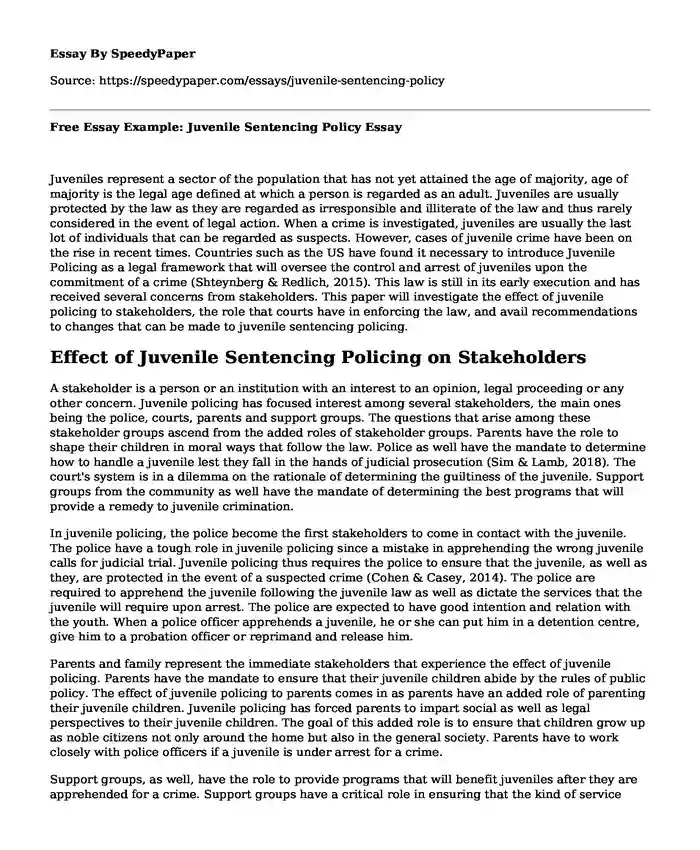Proposed Changes To Juvenile Sentencing In France

Table of Contents
Increased Focus on Rehabilitation and Diversion Programs
The proposed changes emphasize a significant shift away from punitive measures towards rehabilitation and restorative justice for juvenile offenders in France. This involves a multifaceted approach focusing on long-term solutions rather than short-term punishment. This includes:
-
Increased investment in educational and vocational training programs within juvenile detention centers: The goal is to equip young offenders with the skills and qualifications needed to secure employment upon release, reducing the likelihood of recidivism. This involves expanding existing programs and introducing new initiatives tailored to the specific needs of young people in the system. Access to apprenticeships and further education opportunities will be a key component.
-
Expansion of community-based diversion programs, offering alternatives to incarceration for less serious offenses: Diversion programs, such as restorative justice initiatives and community service, provide a more constructive approach for low-level offenses. This will reduce the strain on the juvenile detention system and allow for more individualized support tailored to the needs of the young offender.
-
Greater emphasis on restorative justice practices, involving victims and offenders in resolving conflicts: Restorative justice aims to repair the harm caused by crime and promote reconciliation between the offender and the victim. This process can lead to a greater sense of accountability and responsibility for the young offender while allowing victims to share their experiences and participate in the healing process.
-
More resources for social workers and support services to assist young offenders and their families: Providing adequate support to both the young offender and their family is critical for successful rehabilitation. This includes access to counseling, mental health services, and family therapy, helping address underlying issues that may have contributed to the offense.
Raising the Age of Criminal Responsibility
Discussions are underway to raise the age of criminal responsibility in France, bringing it in line with international standards and recognizing the developmental differences between children and adults. This is a crucial aspect of French juvenile justice reform.
-
Debates on whether to align the age with the UN Convention on the Rights of the Child: The UN Convention advocates for a minimum age of criminal responsibility, and France's current age is under scrutiny in light of this. This debate considers the implications of aligning with international best practices.
-
Exploring alternative methods for addressing the behavior of younger offenders, focusing on education and support rather than prosecution: For younger offenders, focusing on education and support through child protection services, rather than the criminal justice system, is seen as a more effective approach to address the underlying issues.
-
Analyzing the impact of different age thresholds on recidivism rates: Research is being undertaken to determine the optimal age of criminal responsibility by analyzing the impact of various thresholds on re-offending rates. This data-driven approach will inform policy decisions.
Improved Conditions in Juvenile Detention Centers
The proposed reforms aim to significantly improve the conditions and atmosphere within juvenile detention centers in France, prioritizing the well-being and rehabilitation of young detainees. This includes a focus on humane treatment and rehabilitation rather than punishment.
-
Implementing stricter regulations on the use of solitary confinement: The overuse of solitary confinement has been criticized for its detrimental impact on the mental health of young people. Stricter regulations aim to limit its use to only exceptional circumstances.
-
Improving access to healthcare, mental health services, and educational opportunities: Access to comprehensive healthcare, including mental health services, is crucial for the well-being of detained youth. Equally important is the provision of educational opportunities to ensure that young people can continue their education while in detention.
-
Strengthening oversight mechanisms to ensure compliance with human rights standards: Independent monitoring bodies will be strengthened to ensure that detention centers adhere to international human rights standards and that the welfare of young people is prioritized.
-
Investing in more humane and age-appropriate facilities: The modernization and upgrading of facilities are planned to create a more humane and supportive environment for young people in detention. This includes creating age-appropriate spaces and reducing the institutional feel of the facilities.
Strengthening the Role of Families and Support Networks
Recognizing the critical role of families and support networks in the rehabilitation of young offenders, the proposed changes emphasize their active involvement.
-
Increased parental involvement in the rehabilitation process: Parents will be actively involved in the development of rehabilitation plans, and support will be provided to help them participate effectively.
-
Enhanced cooperation between juvenile justice authorities and social services: Stronger collaboration between these agencies is key to providing comprehensive support to young offenders and their families.
-
Development of family support programs to help prevent future offenses: These programs aim to address any underlying family issues that may contribute to delinquency, preventing future offenses.
-
Improved access to mental health services for both young offenders and their families: Addressing the mental health needs of both young offenders and their families is critical for the success of rehabilitation efforts.
Conclusion
The proposed changes to juvenile sentencing in France represent a significant and positive shift towards a more rehabilitative and human rights-focused approach to youth justice. By prioritizing rehabilitation, diversion programs, and improved conditions in detention centers, France aims to reduce recidivism and promote the successful reintegration of young offenders into society. These reforms are crucial steps toward building a more just and equitable juvenile justice system. To stay informed on the progress of these crucial juvenile sentencing changes in France, continue to follow the updates from relevant government sources and organizations advocating for French juvenile justice reform.

Featured Posts
-
 Veterans Memorial Elementary Welcomes Lego Master Manny Garcia Photos From The Visit
May 25, 2025
Veterans Memorial Elementary Welcomes Lego Master Manny Garcia Photos From The Visit
May 25, 2025 -
 Amundi Msci World Ii Ucits Etf Dist A Comprehensive Guide To Net Asset Value
May 25, 2025
Amundi Msci World Ii Ucits Etf Dist A Comprehensive Guide To Net Asset Value
May 25, 2025 -
 Demnas Appointment A New Era For Gucci
May 25, 2025
Demnas Appointment A New Era For Gucci
May 25, 2025 -
 Draper Claims First Atp Masters 1000 Title At Indian Wells
May 25, 2025
Draper Claims First Atp Masters 1000 Title At Indian Wells
May 25, 2025 -
 The George Russell Claire Williams Story A Formula 1 Controversy
May 25, 2025
The George Russell Claire Williams Story A Formula 1 Controversy
May 25, 2025
